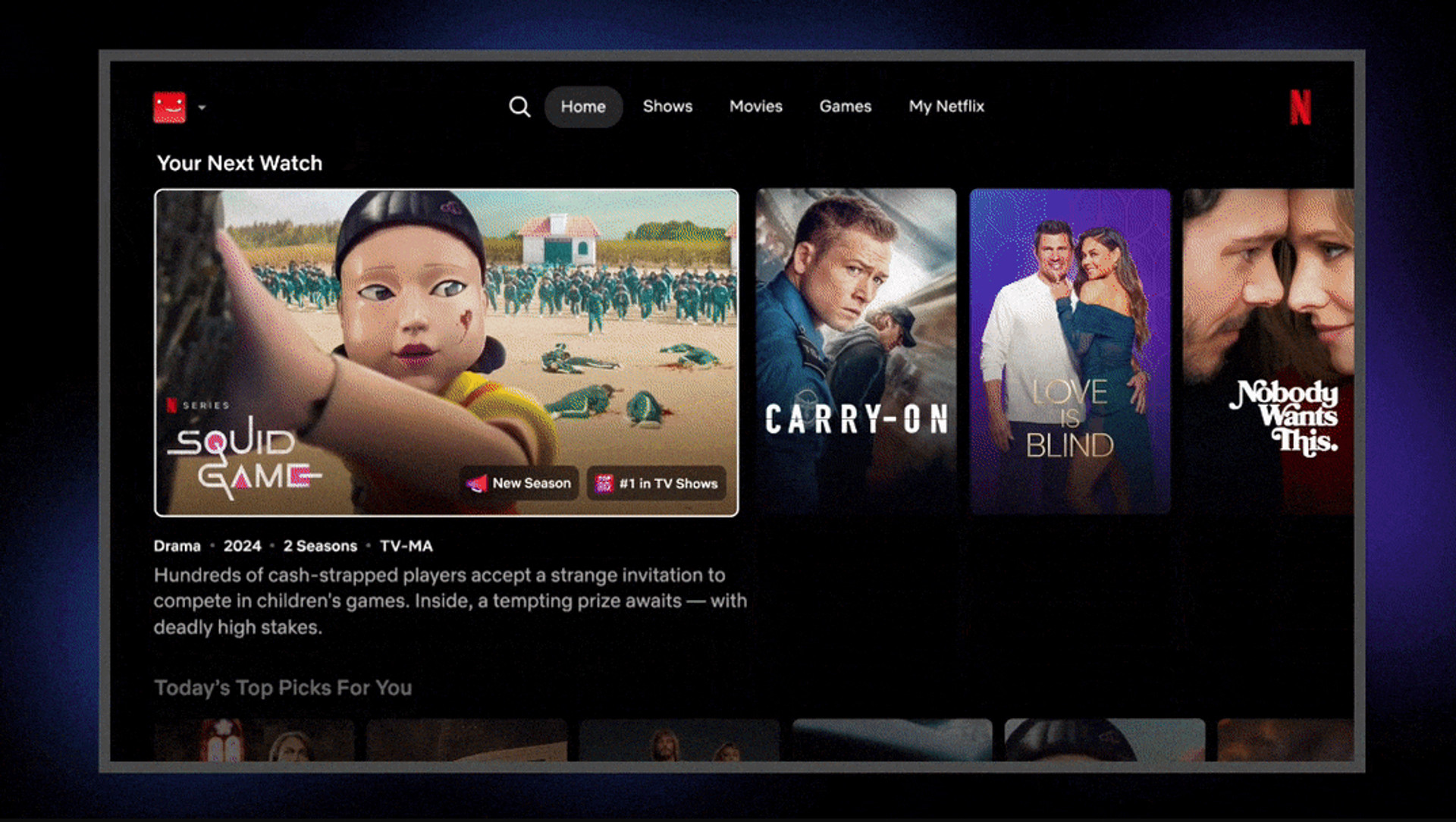Hearing impaired in a child: advice on what to do to parents
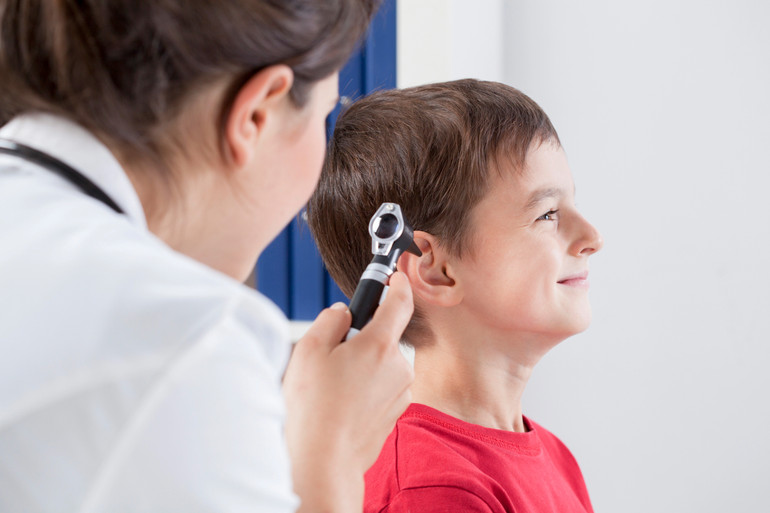
Hearing is critical for the development of the child, because it is through the sounds that the baby gets acquainted with the world around and knows it. However, there are children for whom this method of cognition is limited or impossible due to hearing impairment.
At the same time, it is not a sentence, but new conditions that need to be adapted, because children with hearing impairments can develop and achieve high results in learning and life.
« Ukrainian Truth. Life » talked with the Surdopedagogical Anastasia Ostrovskaya and asked:
-
what to do to parents if their child was diagnosed with hearing impairment;
-
Why is a specialist important and whether the hearing aid will save the situation,
-
How do people live with hearing loss and communicate with each other,
-
How to communicate ethically with children and adults with hearing impairments.
How to diagnose hearing impairment
Among the causes of hearing or hearing loss are genetic factors undergoing infection during pregnancy, meningitis, otitis Or head injuries and ears. If you do not identify the problem in time, it can affect the quality of life.
That is why it is important to check the hearing regularly for both adults and child. Except screening on hereditary and congenital rare diseases, every newborn during the first month of life should be held Audiological screening.
« I advise check the hearing even if there are no problems. If the infant responds badly to sounds or does not respond at all, and the first words did not appear up to a year or a half, then you should go to be examined.
This allows you to detect hearing impairment in a timely manner and start treatment or rehabilitation. Can then be late“ – Anastasia Ostrovskaya emphasizes.
Identify hearing impairment can and with the help of audiometries.
« It determines the intensity and tone of the sound that the ear can perceive, and a few more parameters that can be used to understand how well the hearing operates.
It’s absolutely Safe the procedure, so it is prescribed both adults and children « , – told in the Ministry of Health.
It is important to detect hearing impairment as soon as possible and start rehabilitation
What to do if the child has found hearing impairment and why only hearing aid or cochlear implant is not enough
The diagnosis of « deafness » or hearing impairment can be shocked by parents. However, it is important to consult a specialist and start rehabilitation as soon as possible, use hearing aids or perform Cochlear implantation – This is an operation during which a thin electrode is consumed in the inner ear of the child. It connects with the auditory nerve and transmits sound vibrations into the brain.
« We need to understand when hearing loss has occurred. If a injury or illness, it is important to consider whether or not it has occurred before or after speech.
If the child at the moment she lost her hearing was talking for 2-3 years and after wearing Hearing aidsrehabilitated, it will develop oral speech well, and perhaps not use a sign language at all, « , – explains the expert.
Anastasia Ostrovskaya notes that hearing aids or cochlear implants – not a panacea And do not return the hearing lost 100%. Special classes with correction or a surveyor are also needed. Their effectiveness will depend on whether the child has in addition to hearing impairments and others. According to the expert, sometimes parents start classes too late or do not consult a specialist at all.
« You do not have to look at the child, it is not always possible to see the eyes. It seems to parents that the child is hearing. Here Dad called, she heard and came. But she could just hear that someone was screaming somewhere and to go to that voice. At the same time, who and what she says, she does not hear.
If the child does not go to class, does not wear the apparatus, then, of course, it will only communicate with a sign language, because he does not know how to correlate the word with the subject. Here will not help Vitamins, dietary supplements or any other additives.
To say that all people with hearing impairments need sign language – definitely not. But it is important to identify the violation as soon as possible, start classes and not waste precious time, ” – says Surdopedagogy Anastasia Ostrovskaya.
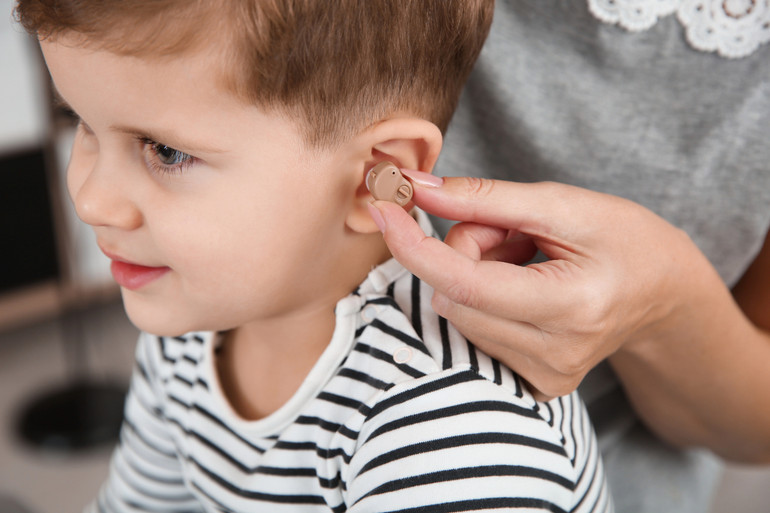
The efficiency of hearing aids will depend on whether the child has in addition to hearing impairment and others
Classes help the child learn how to use his hearing, develop and live in society.
« We learn to distinguish between letters and sounds, interact with the outside world, develop speech and auditory memory, and expand vocabulary.
Until the baby has grown, we try to make the most emphasis on oral speech. She will also know the sign language, although parents do not always support this idea.
At the same time, she does not interfere with teaching a child to talk and understand. Sign language can be an auxiliary tool to develop the brain « , – says Anastasia Ostrovskaya.
Can a child with hearing impaired or deafness to study at a comprehensive school
According to the expert, this question does not have a single -right universal answer.
« The choice of school for a child will depend on many factors, such as the presence of various disorders and the degree of their expression, individual characteristics, whether early intervention has been performed, whether qualitative correction in preschool age has been performed.
In their work, teachers use a bilingual approach, but their purpose is to develop oral speech. It is not just the use of oral and sign language at the same time. Is the use of a sign language as an auxiliary tool « , – says Anastasia Ostrovskaya.
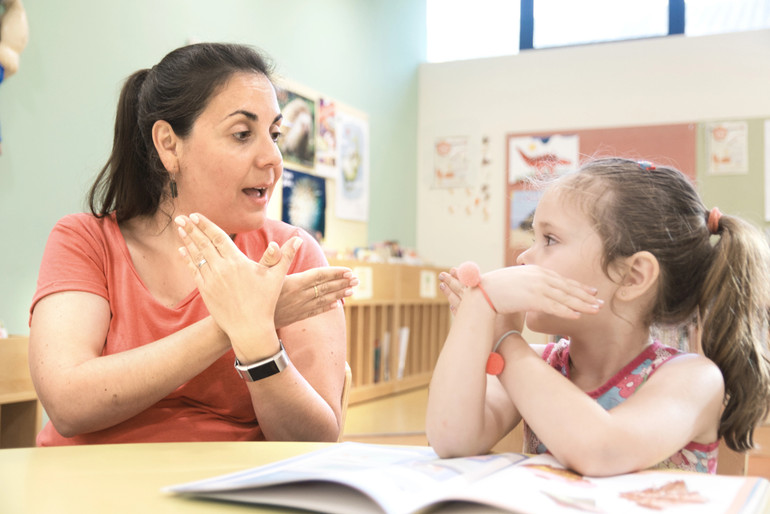
During the classes, teachers use a bilingual approach, but their purpose is to develop oral speech
Secondary schools can come For children with hearing impairments, but not for everyone. If there is only hearing impairment, but the child is qualitatively and timely prosthetics, has no cognitive reductions and problems with the psyche, then it can go to a regular school. The child should be prosthetized as soon as possible, preferably up to three years.
« There will be no sign language, a corrective teacher in a regular school, but such a child should be placed on the first desk. Also, the teacher should understand that when he writes something on the board and returned to the class, all the children hear it, and this child will not understand what he or she will see, because it does not see.
At the same time, children who have other (intellectual disabilities, races (autistic spectrum disorders), cerebral pals epilepsy) « will not pull » training in a regular school. Nevertheless, parents want the child to be surrounded by normotyp children. Therefore, it is appropriate for many to be a special school « , – says Anastasia Ostrovskaya.
Thanks to quality correctional work, children can move from special schools to ordinary schools.
« If the child immediately went to the ordinary school, it would be extremely difficult to cope with the amount of information. Each case is individual », – says Surdopedagogy.
How do not -heard learn to read or write in a language they have never heard
For non -hearing speech is a visual image. They learn to recognize letters and words by articulation. At the same time, many non -hearing children begin to learn oral language, already with a basic knowledge knowledge.
« In the class, we teach the letter written and sounds. It is worth understanding that not everyone has a total deafness and there are hearing residues. For example, loud sounds are easier to hear than consonants, ringing easier than deaf. Compensation goes to tactile and vibration sensations.
To help the child feel better, we use different methods. For example, we show the movements of the lips and tongue during the pronunciation, as well as put a hand on the baby’s chest so that she feels the vibration of the voice. It is a whole science and art.
We also learn to read from the lips. If the child sees the articulation and the outline of the word, then the rest will already think. So children and adults with hearing impairment can understand others, « – says Anastasia Ostrovskaya.
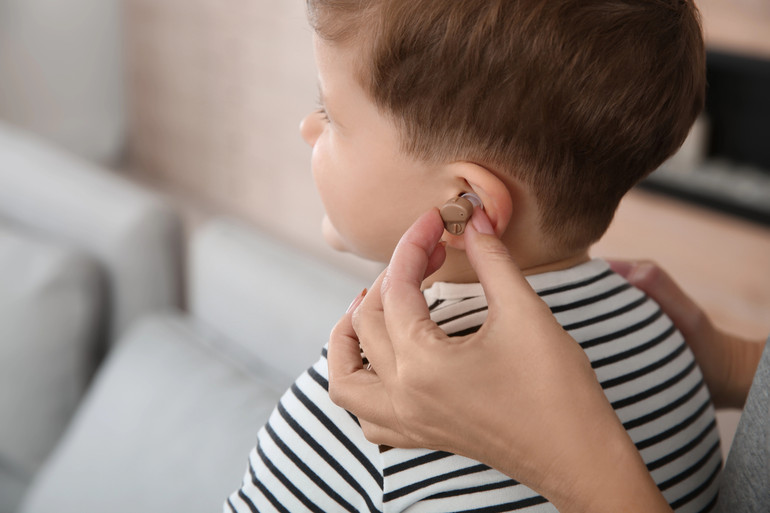
Non -hearing learn to recognize letters and words by articulation
Do parents need to know a sign language if they have a non -hearing child?
In the classroom, the surrounding person tries to activate the child’s speech and make her a gesture language not have to use.
However, if the unnecessary child communicates only with her, then parents must master it. This is done in particular for:
-
strong emotional connection. Sign -language communication will allow parents and child to understand each other, to express their feelings and emotions, to communicate and communicate on different topics;
-
development of mental abilities. Sign language stimulates the development of cognitive abilities in children, including memory and thinking;
-
Adaptation of the child to the world. If parents know the sign language, they will be able to explain the different phenomena and concepts to the child. Thanks to this, it is more socialized.
How to communicate properly with people with hearing impairments and why cannot be called « deaf »
Anastasia Ostrovskaya emphasizes Not worth it name people with hearing impaired « deaf ». It can be offensive and contemptuous.
It is possible to say « deafness » because it is a medical diagnosis, and « deaf » is an unacceptable word. It is also not correct to say « deaf », because many people can communicate verbally.
The best terms are people with hearing impairments or unheaded. Their use demonstrates respect ” – says Anastasia Ostrovskaya.
It is also important to follow the following rules:
-
To attract attention, touch the shoulder of a person. No need to shout or wave your hands loudly;
-
Maintain visual contact during the conversation;
-
talk face to the interlocutorwithout covering their lips with their hands or hair, because usually people with hearing impairment perceive information visually or ear;
-
Speak straight, clearly and slowly. No need to articulate or emphasize;
-
Do not whisper in a whisper – it complicates perception;
-
If possible Choose a quiet place to talkbecause through noise for people with hearing impairment can be difficult to distinguish sounds (although modern hearing aids have the function of noise suppression);
-
Suggest a leaf and a pen for more effective communication.
Vera Shurmakevich, « Ukrainian Truth. Life »

